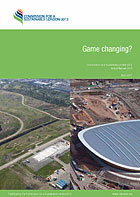Most popular

Annual Review 2010
April 2011
June 2012
Tags: Transport, food, waste, Annual review, review, legacy, pre-games
This is our final review before the Games and having already published reviews of the preparations for staging sustainable Games and the legacy of the Games earlier this year, the bulk of this report is focused on how the Games experience will be distinctly sustainable for different client groups.
London 2012 is the first Olympic and Paralympic Games to attempt to deliver a holistic sustainability programme from construction, through Games-time and into legacy and also the first to open itself up to scrutiny by an independent commission such as ours. Overall this has been a great success. There is no doubt that the ODA has delivered great sustainable venues and their learning legacy is making profound changes to the way the construction industry views sustainability LOCOG has made meticulous plans to deliver unprecedented levels of sustainability through ground-breaking initiatives such as the sustainable sourcing code, diversity and inclusion business charter, food vision and zero waste plans. The local community and communities across the UK have benefited from jobs, skills and employment opportunities through the mostly local procurement programme. London 2012 will be the first public transport Games and the recent publication by the Legacy Corporation of their sustainability guide provides good evidence of their commitment to making the Queen Elizabeth Olympic Park “a blueprint for sustainable living” as promised at the outset.
A relatively small number of important issues remain to be resolved in time for the Games. These include elements of the following issues: site operations to ensure proper waste segregation; energy conservation during the Games; parking for corporate hospitality customers; ecological protection before and after the Games; labour standards in the supply chain; active and accessible travel; assuring compliance with all aspects of the Sustainable Sourcing Code and food vision; sustainability of the Games look and feel; and awareness raising in the event of any Games-time poor air quality episodes. We will continue to engage LOCOG on these issues in the run-up to the Games. During the Games we plan to provide sample assurance at most venues and to produce a report shortly after the Games to record our findings.
Not everything is perfect and there are some issues which will not be resolved by London 2012 and need to be addressed in future. These include: a low carbon fuel source for the Queen Elizabeth Olympic Park; addressing labour standards in the supply chain, particularly for merchandise; and dealing with wider stakeholder concerns about the corporate behaviour of commercial partners. The innovative sponsorship opportunity for “sustainability partners” has not been wholly successful and we would recommend that similar initiatives are much more explicit in their commitments, so the partner “earns” the right rather than just paying for it.
We have always maintained that an Olympiad can only be considered sustainable if it can influence more sustainable behaviour beyond the Games. We have recorded some early encouraging signs and plan to review this aspect in more detail after the Games.
The sustainable London 2012 experience and the work of the commission has been unique, there is much to be learned from the many successes and few failures.
Shaun McCarthy, June 2012
Recommendations
This report makes reference to a number of previous recommendations which remain outstanding or have been satisfactorily closed out. We have two new recommendations to make:
1. That the LLDC ensure that the cumulative overall target for 50 per cent (by weight) transport of materials by rail or water is met during the transformation period.
2. That LOCOG ensures that benchmarks are available for future Games to facilitate more responsible energy use.